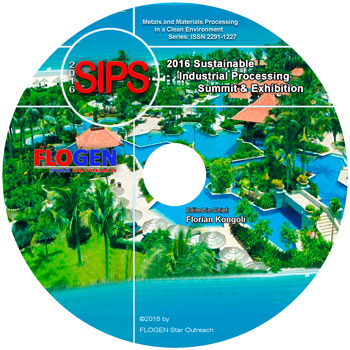2016-Sustainable Industrial Processing Summit
SIPS 2016 Volume 10: Battery, Recycling, Environmental, Mining
| Editors: | Kongoli F, Kumar V, Aifantis K, Pagnanelli F |
| Publisher: | Flogen Star OUTREACH |
| Publication date: | 21 December 2016 |
| Pages: | 220 pages |
| ISBN: | 978-1-987820-54-6 |
| ISSN: | 2291-1227 (Metals and Materials Processing in a Clean Environment Series) |

CD shopping page
Recovery of valuable metals from spent Lithium ion batteries with organic acid leaching
Qing Xue1; Xiaoxiao Zhang1; Li Li1; Feng Wu1; Renjie Chen1;1BEIJING INSTITUTE OF TECHNOLOGY, Beijing, China;
Type of Paper: Regular
Id Paper: 433
Topic: 14
Abstract:
With the boom of consumer electronics (CE) and electric vehicle (EV), a large number of spent lithium-ion batteries (LIBs) have been generated worldwide. Resource depletion and environmental concern driven from the sustainable industry of CE and EV have motivated the urgent recycling of spent LIBs. Hydrometallurgical treatment is the favored technology for recycling of the metals from LIBs compared with pyrometallurgical processes, because it offers such advantages as low energy consumption, less toxic air emissions, and completely recovery of valuable components with high purity. Acid leaching plays a key role in the hydrometallurgical techniques for recovering metals, and strong inorganic acid is the most widely used in the past. However, toxic gases are released during leaching and the waste acid after leaching is a threat to the environment. From an environmental and healthy viewpoint, our group has investigated different organic acids as alternative leaching agents including citric acid, DL-malic acid, ascorbic acid and succinic acid. The leaching efficiencies of valuable metals by these organic acids are comparable with even higher than strong acid and avoid the secondary pollution introduced from strong inorganic acids. The kinetics analyses are also performed for a better understanding of the leaching process. The recycling process we studied with organic acid leaching is highly efficient and environmentally friendly, which can be advanced beyond the laboratory scale to achieve large-scale reclamation of spent LIB.